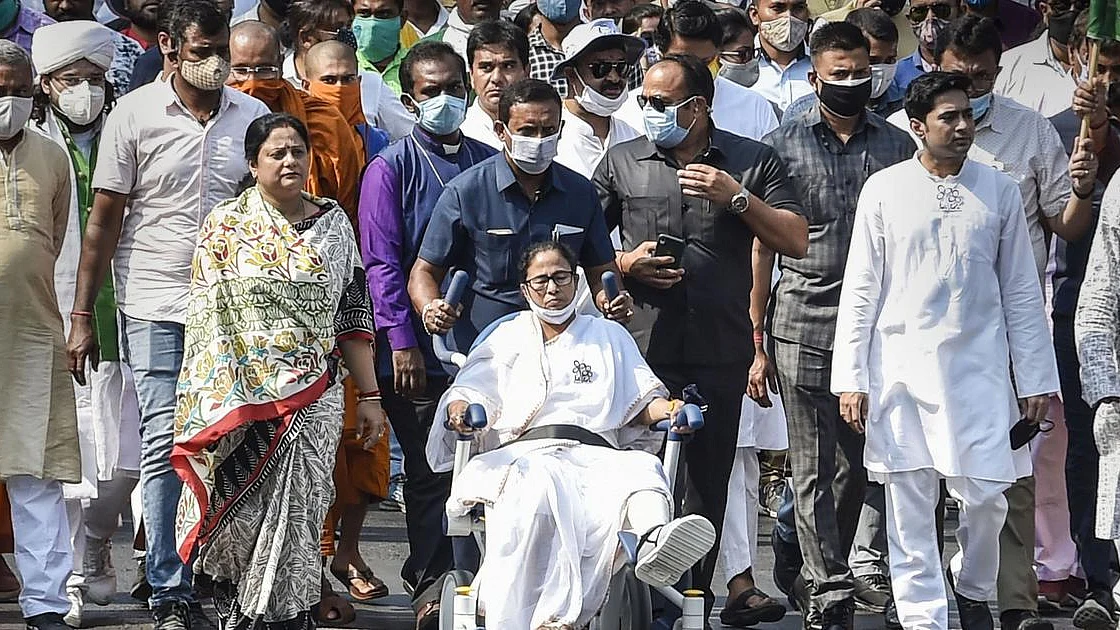Sunday show: How close & how decisive will assembly election results be?
Whatever be the results on Sunday, the task of new govts in the four states and the Union Territory is cut out. Health, education and employment, not temples, will have to drive policies and politics

When counting of votes begin in the five poll-bound states on Sunday (May 2), in all of which barring West Bengal the polling got over on April 6—before the second wave of Covid hit the states—the focus will be on how close the results turn out to be.
Even a month ago, BJP was confident of winning in both Assam and West Bengal. But the party was taken by surprise by the fight put up by the opposition in Assam and the ruling TMC in West Bengal. The results in both the states are, therefore, expected to be much closer than pundits believed.
In West Bengal, where four rounds of polling were held after April 16 and after the controversial firing on voters by CISF jawans, BJP may come to rue stretching the election for so long. Nothing could justify the Election Commission’s poll schedule in West Bengal, the polling beginning on March 27 and ending on April 29.
Whether it was designed by the EC or not, BJP certainly expected to benefit from the schedule. It enabled the Prime Minister and the Home Minister address a record number of political rallies in the state and create a larger- than-life hype over BJP’s prospects. Didi has already lost, mocked the PM while adding that the game was over for her (Khela Shesh) in a reference to TMC’s campaign song daring the BJP to play the game (Khela Hobe, Khela Hobe, Khela Hobe). The Home Minister dutifully invoked the Citizenship Amendment Act (CAA) after April 6, the PM campaigned for Matua (SC Hindus who migrated in large numbers from East Pakistan but who are present in substantial numbers in Bangladesh too) votes from Bangladesh and the party’s IT Cell pulled out all stops in attacking Mamata Banerjee.
It will therefore be a major loss of face for the PM if BJP fails to win convincingly in West Bengal. It will almost certainly be accused of rigging the result, if it does. And if it falters, the result would be taken to be a vote of no-confidence against him, a referendum on his governance and his government’s handling of the economy and the pandemic. Questions will be raised on his campaigning style, which critics would certainly point out, had boomeranged badly.
In both Assam and West Bengal, claim poll watchers, there are far too many close seats to provide any comfort to any party. If the number of such seats in Assam is said to be around 25, in West Bengal the number is twice that and these seats may hold the balance between victory and defeat.
If the question in Assam is if BJP can retain power in the state and whether it will need to engineer defections to form the government, the questions upper most in West Bengal are whether BJP’s tally will be in three digits. The party had just three MLAs in the outgoing Assembly and everybody expects it to increase its tally dramatically. But securing more than 100 seats in the 294-member House would not only give it a psychological advantage, it will also then tempt the party to make a bid for power and secure the support of 50 odd MLAs from other formations. It has done it in the past and it is not beyond the party to do it again.
The two other questions, answers to which are being eagerly sought, are first, if the Left Front, contesting in alliance with the Congress and the Indian Secular Front, can improve its tally and whether INC can retain the seats it had won in 2016. The Left parties put up a spirited fight and fielded a large number of young and promising candidates. It expects its cadre, a large section of which had voted for the BJP in 2016 and 2019 to keep Mamata Banerjee out, to support Left candidates this time. If its tally goes down, there will be a clamour for a purge.
The outcome of the poll in Kerala, Tamil Nadu and Puducherry appears to be clearer than in the eastern states. While history favours the UDF in Kerala, chief minister Pinarayi Vijayan’s handling of the pandemic and the manner in which he stood up to the Centre have given him a certain edge, which LDF hopes will be enough to help it retain power.
In Tamil Nadu, pundits have been on record saying that there was neither a strong anti-incumbency against the AIADMK government nor a strong sentiment for the DMK. But nevertheless, they seem to expect the DMK and its allies to win fairly easily. In Puducherry on the other hand, people seemed to have been left with little choice but to vote for the AIADMK-BJP alliance. The Congress government in the Union Territory was not allowed to work for the past five years and just before the election, the Centre removed the controversial Lieutenant General, former IPS officer Kiran Bedi so that she does not become a rallying point for the Congress.
The message in Puducherry was clear. Unless there is a BJP backed government in the state, the Centre would not allow the state government to function and take effective decisions.
The countdown has begun. May people’s choice prevail.
Views are personal
Follow us on: Facebook, Twitter, Google News, Instagram
Join our official telegram channel (@nationalherald) and stay updated with the latest headlines
